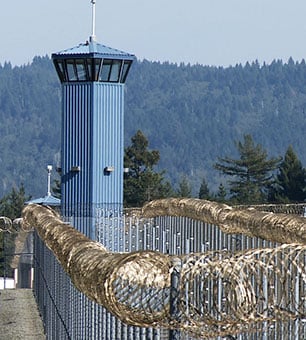Prisoners in Pelican Bay State Prison’s Security Housing Unit (SHU) are isolated for at least twenty-two and a half hours a day in cramped, concrete, windowless cells. They are denied telephone calls, contact visits, any kind of programming, adequate food and, often, medical care. Nearly 750 of these men have been held under these conditions for more than a decade, dozens for over 20 years. This treatment has inflicted profound psychological suffering and caused or exacerbated debilitating physical ailments.
Ostensibly, these men are in the SHU because they associate with gang members and isolating them is necessary to prevent gang activity and racially motivated violence. But in the summer and fall of 2011, these men, joined by other SHU prisoners throughout California, showed this claim to be the lie that it is. Organizing across racial lines, more than 6,000 SHU prisoners went on hunger strike for several weeks to protest their conditions. That’s right – men who have been isolated for over a decade and deprived of basic human rights because they are allegedly connected to racially divided gangs worked together to demand basic rights and constitutional protections for themselves and one another. Now they have resumed their hunger strike, demanding that the California Department of Corrections and Rehabilitation meet their demands.
Here is the third in our series of their stories and those of their families.
Read the Entire Series: Pelican Bay Hunger-Strikers’
Todd Ashker, plaintiff in the Center for Constitutional Rights lawsuit challenging long-term solitary confinement
I was transferred to the Pelican Bay SHU on May 2, 1990, whereupon staff told me that I would be here until I paroled, died or debriefed. I’ve been here ever since.
In 2004, I was party to a group request for program opportunities in order to be able to meet parole board recommendations for parole suitability. Pelican Bay’s written response was, “denied. You are considered a terrorist and until you agree to fully assist the authorities with bringing down the gangs, you will remain in SHU with no program opportunities. In our opinion, you should never be deemed suitable for parole without assisting the authorities.”
One of the first things gang unit staff ask a debriefer is, “Do you want to call your wife and family and tell them that you’re done and let them know they may be in danger?” This threat is well established – many debriefers and their family members outside prison have been seriously assaulted and killed.
This attitude is in keeping with how prison staff view prisoners and their families. In 1992, my paraplegic mom traveled 400 miles to visit me. Visit staff told her she’d have to wheel herself to the SHU visiting area. Another visitor assisted her. The next day, staff hassled her for four hours before letting her in to visit. She never came back due to what happened. Over the years, I received two ten-minutes phone calls with her: one when my sister died in 1998, and one when my grandmother died in 2000. Pelican Bay staff told me many times that if I wanted to be transferred closer to my mom so I could see her, all I had to do was debrief. She has since passed away.
48 Hours Left: All gifts to Truthout now matched!
From now until the end of the year, all donations to Truthout will be matched dollar for dollar up to $28,000! Thanks to a generous supporter, your one-time gift today will be matched immediately. As well, your monthly donation will be matched for the whole first year, doubling your impact.
We have just 48 hours left to raise $28,000 and receive the full match.
This matching gift comes at a critical time. As Trump attempts to silence dissenting voices and oppositional nonprofits, reader support is our best defense against the right-wing agenda.
Help Truthout confront Trump’s fascism in 2026, and have your donation matched now!
